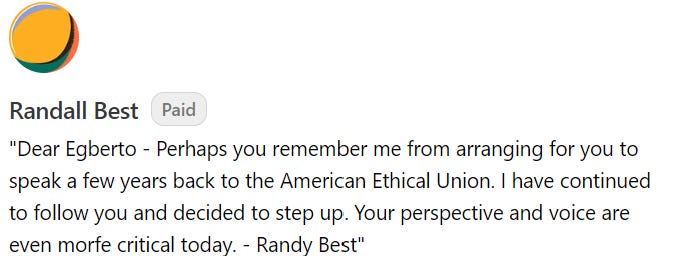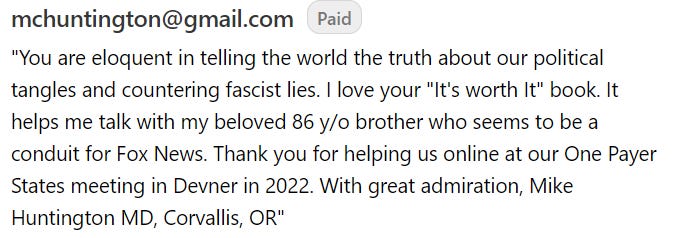WATCH: Ronald Reagan Supported Open Borders! Imagine if VP Kamala Harris Said This.
MAGA Republicans’ inhumane immigration stance spits in the face of their Jesus, Ronald Reagan, and Bush. Imagine MAGA Republicans’ reaction if VP Kamala Harris supported open borders as Reagan did.
THANK YOU IN ADVANCE FOR YOUR SUPPORT! We are feverishly working triple time to ensure we win this existential election.
We are grateful for our Paid Subscribers and Free Subscribers. In this political climate, we need several hundred more Paid Subscribers. Misinformation funded by the deep pockets of our Oligarchy floods the internet. We are using all our platforms on-air, online, and in publications to counter that. We ask that you invest the equivalent of less than a coffee to ensure we can keep doing this effectively. Please invest in a Democracy that serves all of us by becoming a paid subscriber. It comes with many benefits.
Ronald Reagan Supported Open Borders!
The immigration debate remains a hotly contested issue, often revealing the stark contrasts between historical and contemporary viewpoints. A recent discussion highlights how dramatically the conversation around immigration has shifted, particularly by comparing past Republican stances to current rhetoric. This analysis centers on a notable example: George HW Bush and Ronald Reagan‘s surprisingly progressive views on immigration and how they contrast with today’s Republican Party. The juxtaposition of Bush’s and Reagan’s policies with contemporary stances illustrates a significant ideological shift within the party. It raises intriguing questions about how modern politicians, such as Vice President Kamala Harris, might be perceived if they expressed similar sentiments.
In the late 20th century, during Ronald Reagan’s presidency, the discourse around immigration was notably more nuanced and humane than it is today. Reagan, often viewed as a conservative icon, expressed views that would be considered progressive by today’s standards. In a clip from the early 1980s, Reagan discussed the complexities of undocumented labor with a level of empathy and pragmatism that starkly contrasts the prevailing attitudes within today’s Republican Party. Reagan advocated for a more compassionate approach, suggesting that the U.S. should work towards a system that allows labor to move across borders legally and effectively. He emphasized the importance of treating undocumented immigrants as valuable contributors to society rather than as mere lawbreakers.
Reagan’s vision included legalizing the labor movement and implementing work permits, enabling immigrants to contribute to the economy while maintaining ties to their home countries. His stance was about easing legal restrictions and fostering a more amicable relationship with neighboring countries, particularly Mexico. Reagan’s approach underscored a recognition of the economic and human dimensions of immigration, proposing that the U.S. should strive for a system where immigrants could work legally, pay taxes, and return home if they chose to, all while reinforcing the notion of shared responsibilities and mutual benefits.
Fast forward to the present day, and the contrast is stark. The Republican Party has increasingly embraced a more restrictive and, at times, hostile approach to immigration. The rhetoric from figures like former President Donald Trump and his MAGA base often portrays undocumented immigrants as threats to American jobs and social services. This narrative sharply opposes Reagan’s vision, reflecting a shift towards more stringent and punitive policies. For instance, Trump’s frequent claims about undocumented immigrants draining Social Security funds are demonstrably false. Studies show that undocumented workers contribute significantly to Social Security and Medicare without reaping the benefits, a fact that underlines the misleading nature of such rhetoric.
The transformation in the Republican Party’s stance on immigration prompts a thought experiment: How would contemporary figures, particularly from the Democratic Party, be perceived if they articulated views similar to Reagan’s? Consider Kamala Harris, the current Vice President, and her hypothetical endorsement of Reagan-esque immigration policies. If Harris were to advocate for open borders and a system allowing for a flexible labor movement akin to Reagan’s vision, the reaction from the political right would likely be intense. The term “open borders” has become a pejorative in the current political climate, used to paint opponents as unrealistic or dangerously permissive. Harris’s support for such policies would probably lead to significant backlash, with accusations of promoting unchecked immigration and undermining national security.
Yet, this contrast also reveals an important dialogue about the evolution of American political ideologies and the impact of rhetoric on public perception. The current Republican stance, characterized by stringent enforcement and exclusionary measures, reflects a broader trend toward nationalism and isolationism. In contrast, Reagan’s approach, emphasizing humane treatment and practical solutions, offers a reminder of a time when the immigration debate encompassed broader perspectives.
The shift in attitudes highlights the need to reevaluate current immigration policies and the narratives that drive them. Advocates for a more compassionate approach can draw lessons from Reagan’s presidency, emphasizing the potential benefits of policies that balance security with empathy. By revisiting and reinvigorating such progressive ideals, there is an opportunity to foster a more inclusive and pragmatic immigration system that acknowledges the contributions of all workers, regardless of their legal status.
The comparison between Ronald Reagan’s views on immigration and the current Republican stance underscores a significant ideological shift. Reagan’s perspective, which embraced a more open and empathetic approach, contrasts sharply with today’s more restrictive policies. If modern politicians like Kamala Harris were to voice similar views, they would face considerable opposition, illustrating the evolving and often contentious nature of the immigration debate in American politics.
Viewers are encouraged to subscribe and join the conversation for more insightful commentary and to support progressive messages. Together, we can populate the internet with progressive messages that represent the true aspirations of most Americans.
Can we count on your help to reach our goal of 300 needed new paid subscriptions by the end of the month?
The other side has big donors and everyday citizens who invest heavily in platforms that lie and misinform. All we have is you. So, please invest in our media outlet by clicking the subscribe button below to become a paid subscriber. You won’t miss that coffee, but it will make a difference in our politics as we spread the truth about our policies and progressive politics. All paid subscribers get to read my five books on this platform and all subsequent books I write. They will also be privy to subsequent incentives.









I played that clip for my kids a few years ago (shortly after Donald came down his golden elevator) and they couldn’t believe it. The fact the GOP abandoned those principles is reason number 3 in a growing list of about 417,891 reasons (grows by the day) i am no longer a Republican.
I am enjoying your substack. Just joined as paid subscriber. Keep up good work. Thx